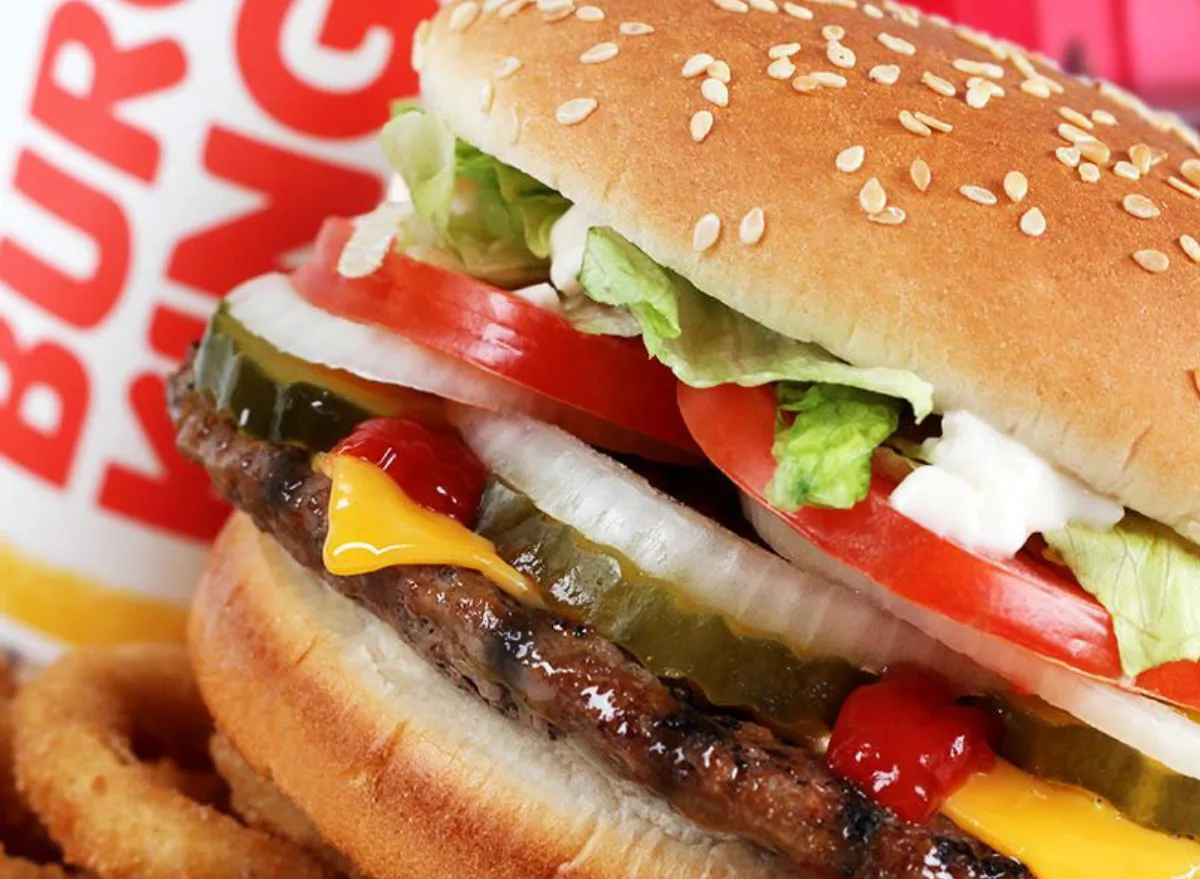Sometimes it’s hard to ignore your fast food cravings, especially if you’ve had a long day at work or school and really aren’t in the mood to cook a whole meal from scratch. If you’ve had a particularly stressful day, craving a juicy fast-food burger can be expected, as emotional eating is a common coping mechanism for many of us. Thankfully, certain fast-food chains like Burger King, which boasts 6,850 locations in America alone, offer relatively healthier options that can be a better choice in the nutritional department.
It’s hard to understand what’s healthier for you when sorting through the chain’s huge menu, especially when there’s a stack of cars behind you and you’re feeling rushed. Also, with Burger King’s rollout of their Impossible Whopper, things can get more muddled than ever! Should you go for the meat alternative or just consume more meat to get that iron and protein? To save you the headache of choosing, we’ve rounded up the top five healthiest Burger King burgers, while also listing the top five unhealthiest options, so that the drive-thru will be a breeze.
How to choose a healthy burger at Burger King
To choose the healthiest burgers at Burger King, we took a deep dive into BK’s Nutrition Explorer, which provides up-to-date and totally transparent information on all nutritional info. Looking into these facts, we noticed an unsurprising trend: the bigger the burger (or the more beef patties included), the less appealing the burgers were—from a nutrition standpoint, not from a taste standpoint. And how did we determine what’s nutritious and what’s not? We looked at three main nutritional indicators including:
- Calorie Count: Although calories aren’t always the best indicator of what’s nutritious (many highly processed foods can have fewer calories than, say, an apple), calories can be an important indicator of overconsumption, and monitoring them can help you stay on track toward your nutrition goals. Although daily calorie needs can fluctuate from person to person, we opted for burgers that are lower in calories. Many of the burgers on our “unhealthy” menu exceed the lower end of this spectrum and account for nearly half of the higher end.
- Saturated Fat: Saturated fats are solid at room temperature, and overconsumption is linked to heart health concerns, like elevated LDL “bad” cholesterol. Because of this, we chose options that are on the lower side of saturated fat. None of the burgers on our “best” list have more than seven grams of saturated fat. But note, that even seven grams of saturated fat can be too much for one person to consume if they are trying to support their heart health, depending on factors like their food choices for the rest of the day and their caloric intake.
- Sodium: Salt and sodium are necessary for proper bodily function, but too much of a good thing can lead to serious adverse side effects. Too much sodium can lead to high blood pressure (nearly 48% of all Americans have hypertension or high blood pressure), heart disease, and/or stroke. It’s important to keep your sodium levels to around 1,550 milligrams per day, according to the American Heart Association. While it was no easy feat, we tried to keep the sodium level of the “best” burgers around 500 milligrams. The key word in this scenario is “tried.”
The Best and Worst Burger King Burgers
Most people are not running to Burger King expecting to enjoy the healthiest meal on the planet. But for those who are focused on supporting their overall health, indulging in a burger once in a while is totally doable.
Also, when you are enjoying your burger, keep your french fry portion on the smaller side (if you are eating fries) and opt for a smaller-sized soda (or skip the soda altogether and drink water instead).
Without further ado, here are the five burger options on the Burger King menu that appear to be the healthiest choices along with the five options that you should skip ordering whenever you can. Read on, and for more, don’t miss the 12 Unhealthiest McDonald’s Burgers of All Time.
5 Healthiest Burger King Burgers
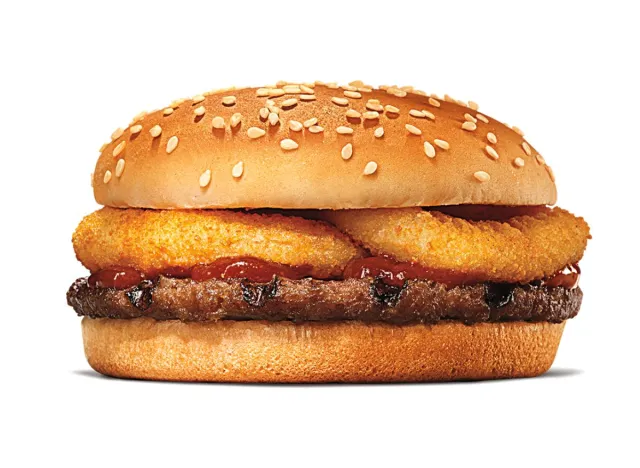

340 calories, 13.1 g fat (4.5 g saturated fat), 500 mg sodium, 41.2 g carbs (2.1 g fiber, 10 g sugar), 16 g protein
Surprisingly, Burger King’s Rodeo Burger clocks in under 350 calories and includes a hefty 16 grams of protein. Why is it surprising? The Rodeo Burger features fried onion rings and barbecue sauce (which contributes to the higher 10 grams of sugar), but still, you aren’t ingesting nearly the fat and sugar amounts of the heftier options further down the menu. So, feel free to get your onion ring fix, just remember to consume in moderation.
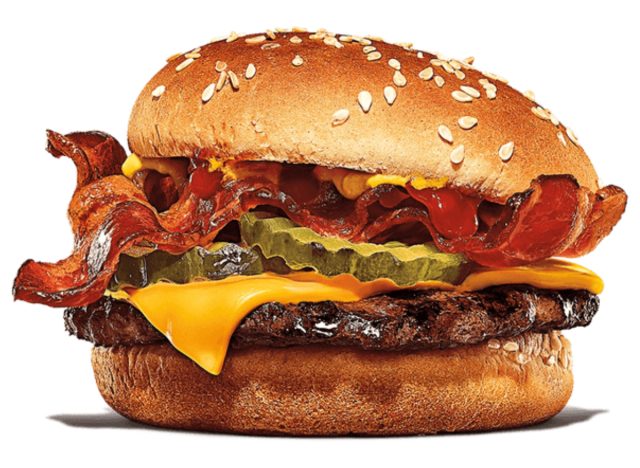

340 calories, 16 g fat (7 g saturated fat), 940 mg sodium, 30.8 g carbs (1.2 g fiber, 7.4 g sugar), 18.1 g protein
Let’s face it, bacon is delicious. And thanks to Burger King’s Bacon Cheeseburger, you don’t have to sacrifice all of your health goals to enjoy a few sumptuous slices. BK’s Bacon Cheeseburger adds a relatively minimal amount of calories to the Whopper Jr., and you get about three more grams of protein thrown into the mix. As bacon does have quite a lot of sodium, we recommend enjoying this burger in moderation and pairing your meal with a tall glass of water.
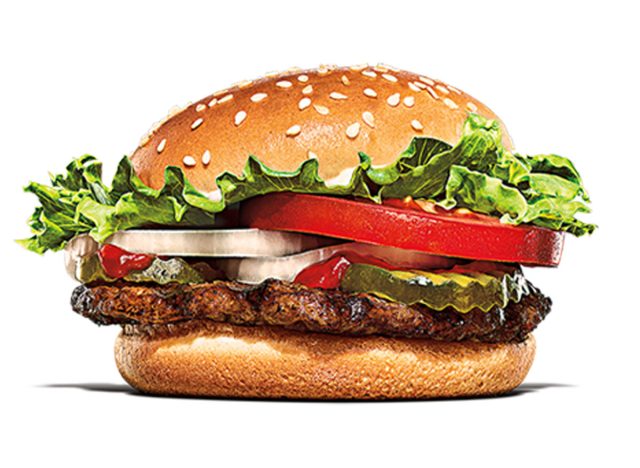

330 calories, 19 g fat (5 g saturated fat), 560.2 mg sodium, 30.2 g carbs (2.2 g fiber, 7.3 g sugar), 15.3 g protein
Although the term “Whopper” has received a bad nutritional rap in past years, the “jr.” portion makes it into the top five healthiest BK options with only 330 calories and 15.3 grams of protein to keep you full throughout your day. Really, the only difference between the Whopper Jr. and the traditional burger is that the Whopper option has a plethora of vegetable toppings including tomatoes, lettuce, pickles, and sliced white onions (which we’re all about).
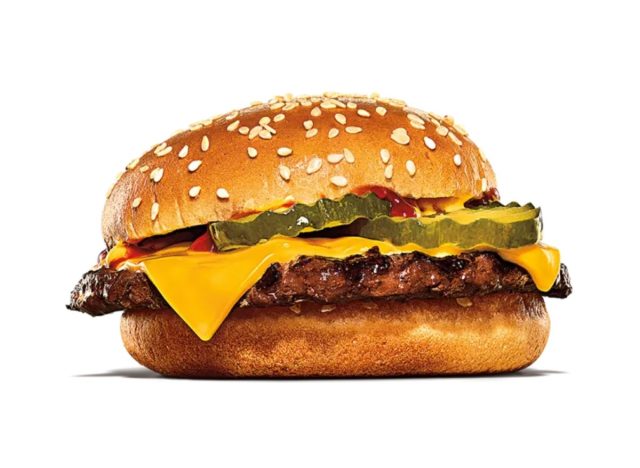

290 calories, 13 g fat (6 g saturated fat), 780 mg sodium, 30.7 g carbs (1.2 g fiber, 7.3 g sugar), 15.1 g protein
Right behind the traditional hamburger comes the Cheeseburger. Add on that slice of melted American cheese, and you get two more grams of protein without a dramatic uptick in calories, fat, or sodium. Additionally, cheese is a natural source of calcium and vitamin D for bone health, while beef is packed with 2.5 milligrams of iron per standard serving, according to the Dietary Guidelines for Americans.
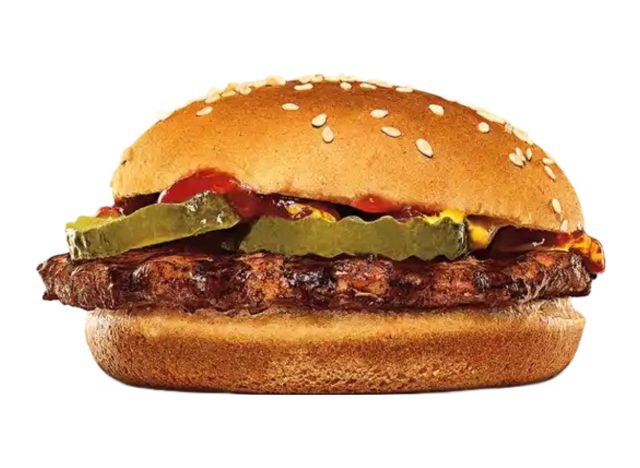

250 calories, 10 g fat (4 g saturated fat), 560 mg sodium, 29 g carbs (1.1 g fiber, 7.1 g sugar), 13.1 g protein
READ RELATED: Are You Taking Care Of Your Eyes? Tips To Maintain Good Eye Health
It may not come as a surprise that the healthiest option on Burger King’s vast burger menu is the traditional Hamburger. With a single patty and pickle topping, this burger really epitomizes the importance of portion control. You’re still consuming 13.1 grams of protein without the astronomical calorie counts, fat, and sodium found in other larger options.
5 Unhealthiest Burger King Burgers
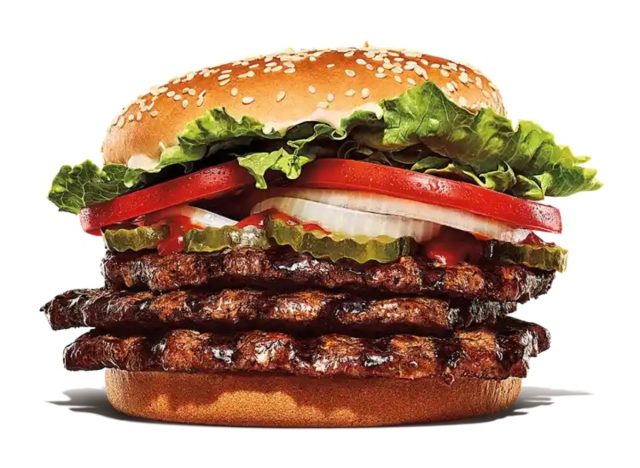

1,170 calories, 80 g fat (27.1 g saturated fat), 1,300 mg sodium, 56 g carbs (3.2 g fiber, 13.5 g sugar), 72.5 g protein
The Triple Whopper—without any bacon or cheese—clocks in at number five. This burger offers 72.5 grams of protein, which may be way more than what you need in a day. And the 1,170 calories it provides is more than half of what most Americans require every day.
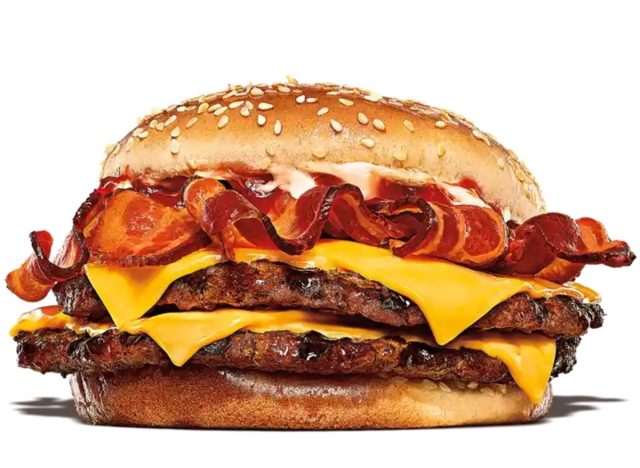

1,200 calories, 81 g fat (32 g saturated fat), 2,270 mg sodium, 58 g carbs (2.9 g fiber, 15.6 g sugar), 66.4 g protein
The Bacon King differs from the Triple Whopper in that it “only” has two beef patties and, unfortunately, does not include any of the veggie toppings. Although this may be a slightly better option because of lower beef consumption, this burger doesn’t include many health benefits and instead packs the highest sodium count on our entire list at 2,270 milligrams of sodium!
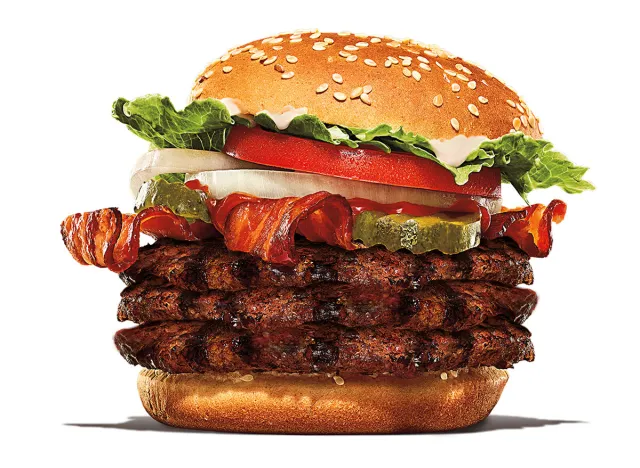

1,260 calories, 87 g fat (29.1 g saturated fat), 1,300.3 mg sodium, 56.2 g carbs (4.2 g fiber, 13.6 g sugar), 78.5 g protein
Burger King offers customers the option to remove the cheese on their Triple Whopper and keep the bacon, yet you really don’t see a big difference in nutritional value. When you remove the cheese, you’re giving up on that bit of calcium and Vitamin D in favor of bacon that, although delicious, really doesn’t add any nutritional value. In fact, overconsumption of bacon can lead to adverse health outcomes due to high levels of cholesterol.
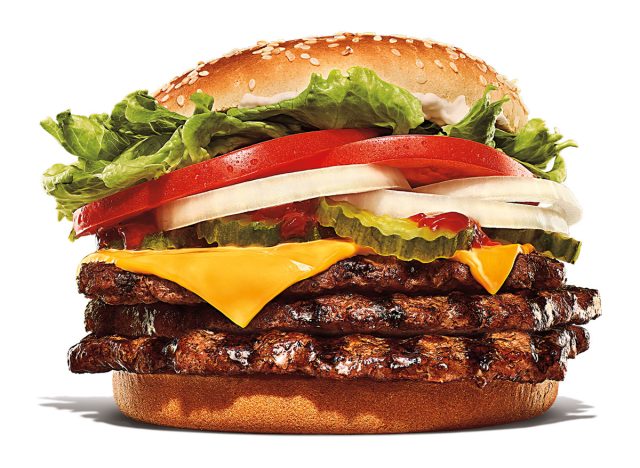

1,300 calories, 90 g fat (33.1 g saturated fat), 1,940.1 mg sodium, 59.3 g carbs (4.3 g fiber, 15 g sugar), 77.5 g protein
Just take off the bacon, and you’ve got the Triple Whopper with Cheese. Removing the bacon actually only decreases your calorie consumption by 50 calories and 4 grams of fat, showing that the real crux of the issue here isn’t bacon consumption but overconsumption of the patties themselves. Although beef (when cooked without excess fats and oils) provides ample protein and iron, portion control still must be a factor when considering your heart health and risk of stroke or heart attack.
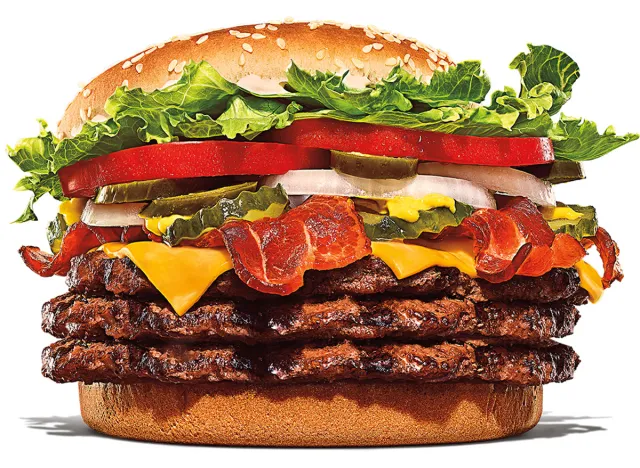

1,350 calories, 94 g fat (33.1 g saturated fat), 1,990.3 mg sodium, 59.5 g carbs (4.3 g fiber, 15.1 g sugar), 82.5 g protein
Clocking in at number one in our search for the unhealthiest Burger King burger is none other than the Triple Whopper with Bacon and Cheese. Basically, the Triple Whopper is just the Whopper Jr….times three! In one burger, you’re consuming nearly your entire daily calorie needs, 94 grams of fat, and a whopping (excuse the pun) 1,990.3 milligrams of sodium. According to the American Heart Association, the ideal sodium limit per day comes to no more than 1,550 milligrams to avoid heart disease and potential stroke.

